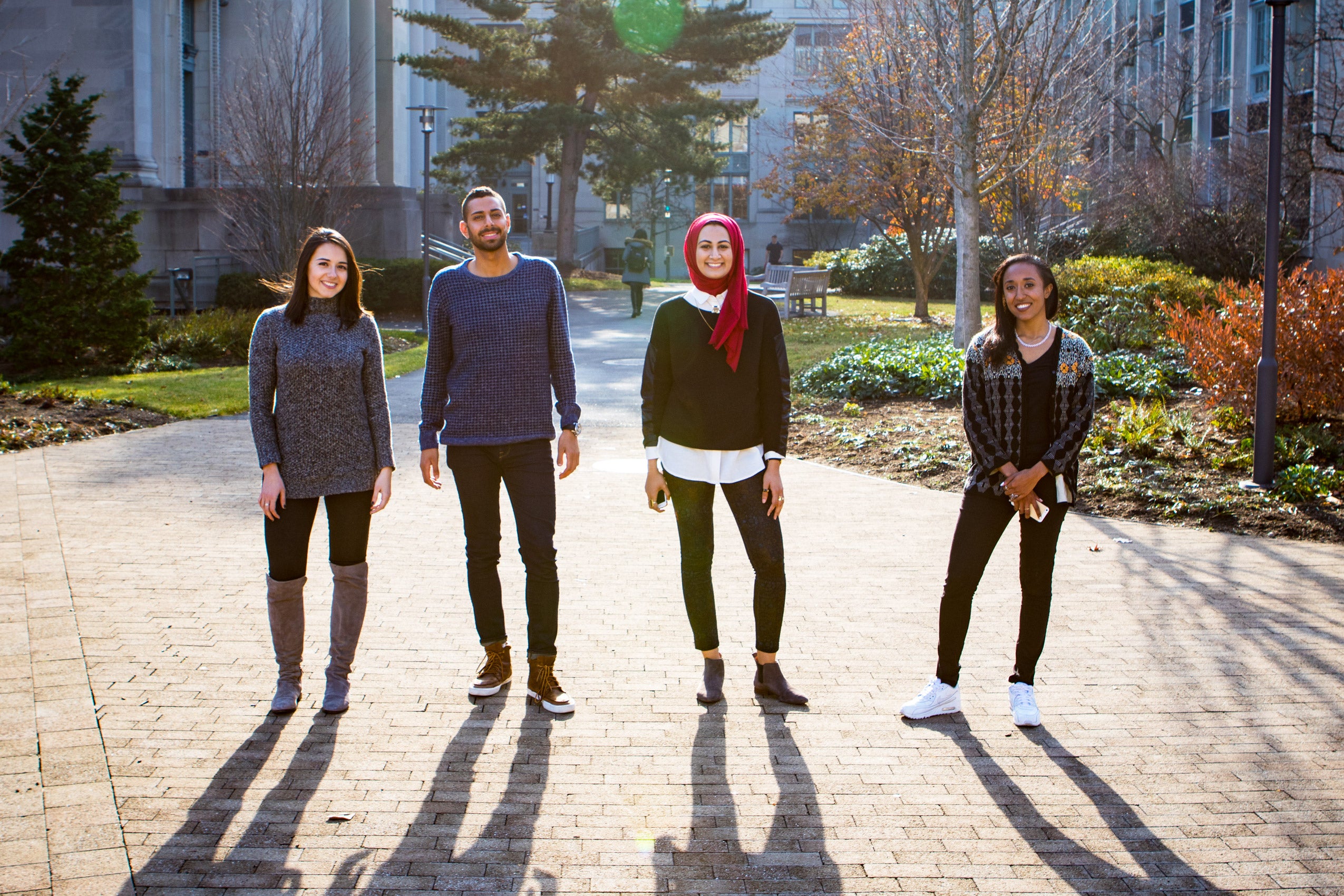“I was called a terrorist. I was pushed up against lockers,” said Yaseen Eldik ’16 of his experience as an American Muslim teenager in the immediate aftermath of the September 11th attacks. “My family and I became a target for the anger and frustration in my community.”
In the wake of recent attacks by ISIS, and harsh political rhetoric surrounding Syrian refugees and foreign Muslims in general, Eldik and fellow Muslim students see a familiar pattern of fear and blame resurfacing.
Eldik is a member of the Harvard Muslim Law Students Association (MLSA) a student-run organization focused on community building and increasing awareness of issues that impact Muslims. On Dec. 15, 2015, members of the group published a brief video message to Muslim youth expressing empathy and support during a time of heightened tensions.
The video is part of a social media campaign to create a network of mentorship for Muslim American youth who are harmed and discouraged by Islamophobic sentiment. Using the hashtag #yourvoicematters, the students hope to generate a positive dialogue focused on reclaiming and celebrating Muslim identity.
The child of Egyptian emigres, Eldik struggled to reconcile life as an American teen with his identity as a Muslim. “I began to see the way Muslims on Long Island felt less American,” he said, elaborating that common symbols associated with Islam—his mother’s headscarves for example—became a source of discomfort for many non-Muslims.
The students hope their campaign encourages Muslim youth to share their own stories and be active in their communities, and that that it also provides a sense of community to those feeling alone and a means of finding allies.
“Creating a virtual community and taking people out of their isolation is the immediate goal,” said Noorulain Zafar ’16, former MLSA president. “The message is ‘we understand what you are going through. We’ve been through that. You’re not alone in this, and we want to be here to help you in whatever way we can.’” She sees young Muslims as particularly vulnerable in the current political climate: “In addition to dealing with all the stuff you have to deal with anyway as a young person, you’re constantly bombarded with messages telling you that you’re not valued, or that you have to apologize for actions of others.”
Zafar grew up in Texas outside of Dallas after emigrating to the United States from Pakistan with her parents. Focused on human rights law and civil rights law, at HLS, she, like Eldik, says her identity as a Muslim American is intertwined with her professional interests. “I can’t easily separate the two,” she added. She got involved with MLSA after feeling that Muslim students did not have a substantive voice on campus. “Muslims are always being talked about, whether from a policy lens, or a legal lens, or a national security lens, but I felt that the Muslim voice was lacking in these conversations on campus,” she said.
Zafar sent the video to community leaders at her mosque in Texas, who then sent it out to other community and youth groups. The response has been positive so far, and she hopes that young people will feel inspired to get more involved.
Aida Vajzovic ’17 likened the campaign to the It Gets Better Project, in which LGBT adults offered words of support to youth grappling with isolation and depression as the result of bullying and harassment. “We want youth to be comfortable engaging in both aspects of their identity—as Americans and as Muslims,” she said, “to use their rights and privileges as Americans and the support and resources of their religion to help become the fullest they can be.”
Vajzovic was born in Bosnia and emigrated with her family to the U.S. as a refugee of the Bosnian War. She grew up in St. Louis, Mo., in a Bosnian community that was predominantly Muslim. When she arrived at law school she discovered the Muslim presence was not as large as she had hoped for, but quickly found a sense of community with MLSA. “It was nice being around people that identified with me in a different way than a lot of my classmates.” Growing that community has been one of her goals since getting involved.
Aya Saed ’17 also emigrated to the United States as a political refugee. Born in Saudi Arabia, she came to the United States in 1999 from Sudan. “9/11 really shook my place in this country, and my religion became a very integral part of my political identity,” she said. The feelings of shame and victimization she felt soon after arriving in the United States inspired her to study international relations and ultimately go to law school. Studying law and policy became a means of empowerment and protection for her and her family. “There’s a large part of me that’s committed to mobilizing Muslims in America so that we start functioning as a body that is heard by policy makers,” she said. “We just don’t have a collective identity that’s powerful, even though we have the numbers and the resources. We just haven’t built the infrastructure and I want to be a part of that process.” Saed is the current president of MLSA and a joint degree student, getting a J.D. at HLS and a Master of Public Affairs at Princeton University.
Because of their own experiences, Vajzovic and Saed find the recent political discourse surrounding Muslim refugees particularly distressing. “If the rhetoric today was the same twenty years ago, I don’t know if we’d be here. We might not be alive. That scares me,” said Vajzovic. “One thing this campaign aspires to do is to humanize the Muslim experience for non-Muslims. A lot of what you hear in the news are generic statements about hate crimes, or certain politicians speaking broadly about Muslims, but you don’t really hear Muslims themselves expressing how they’re feeling.” She feels that an important part of building a support network that includes non-Muslim allies is to share these missing perspectives and stories.
